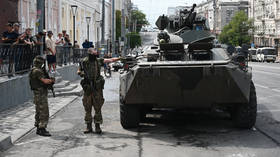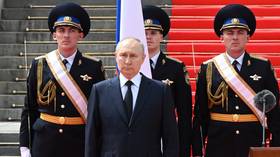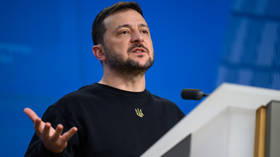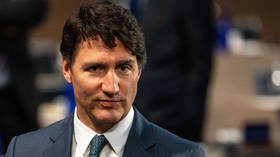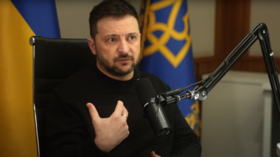Lukashenko details talks with Putin and mediation that ended mutiny
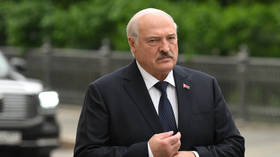
Russia amassed some 10,000 troops to repel the Wagner private military company’s march on Moscow last week, Belarusian President Alexander Lukashenko said in Minsk on Tuesday, adding that he was also ready to send his forces to Russia.
Lukashenko said Russia would have prevailed in a standoff against the mutineers, but it might have resulted in “thousands” of deaths, so a peaceful solution was the priority. He added that Russian President Vladimir Putin kept him “thoroughly” updated on the situation, leading the Belarusian leader to offer to help as mediator.
“The most dangerous thing… was not the situation itself but its potential consequences,” Lukashenko told the Belarusian military in a speech on Tuesday.
He said Putin told him the Wagner PMC founder, Evgeny Prigozhin, was refusing to talk to anyone and that attempting to negotiate with him would be “useless”. Nonetheless, Lukashenko apparently managed to establish contact, with the help of the Russian Federal Security Service.
Prigozhin was in a state of “total euphoria” for the first 30 minutes, and they were speaking mostly in obscenities, the Belarusian leader admitted. “There were 10 times more swear words than normal ones,” he recalled.
According to Lukashenko, the Wagner Group commanders had been frustrated by battlefield losses suffered in Ukraine and had “heavily influenced” Prigozhin, who claimed he was merely demanding “justice” in calling for the removal of Russian generals.
During their talks, Lukashenko said he warned Prigozhin that he would be “crushed like a bug” should he dare to continue his march on Moscow.
The Belarusian leader described how he warned Prigozhin that a military brigade was ready for deployment to Moscow to defend the Russian capital if needed. He also admitted concerns that the unrest could spill out of Russia, and “we would have been next.”
At 5pm Moscow time during the mutiny, Prigozhin called to say he would accept Lukashenko’s terms, but demanded security guarantees for himself and his fighters. At that point, Lukashenko contacted FSB chief Aleksandr Bortnikov and agreed with him that Russia would not strike Wagner troops.
Lukashenko “promised” Prigozhin this would not happen and offered a “guarantee” that he would accept Wagner fighters in Belarus and ensure their safety.
Russian Deputy Defense Minister Yunus-Bek Yevkurov also played an “important role” in the negotiations, Lukashenko said. On Saturday, a video of Yevkurov speaking to the Wagner chief in the Russian city of Rostov-on-Don, which had been overrun by the group’s fighters, emerged online.
Talks ended on Saturday evening, Lukashenko said, noting that he had to “hurry” as Russia had “already built a defensive line some 200 km from Moscow.”
“I was afraid if the Wagner fighters clashed with them at that line, blood would have been spilled and that would have been it,” he recounted.
In the end, Lukashenko facilitated a direct phone call between Prigozhin and Bortnikov. After talking to the Russian FSB chief, the Wagner chief ordered his fighters to pull back and return to their field camps. Following this, Lukashenko said he had another call with Putin in which the Russian leader vowed to keep his promises.
Putin later stated that the Russian authorities would not prosecute Prigozhin or his troops, and offered Wagner fighters a choice to either sign contracts with Russia’s Defense Ministry or other security agencies, return home, or move to neighboring Belarus.
